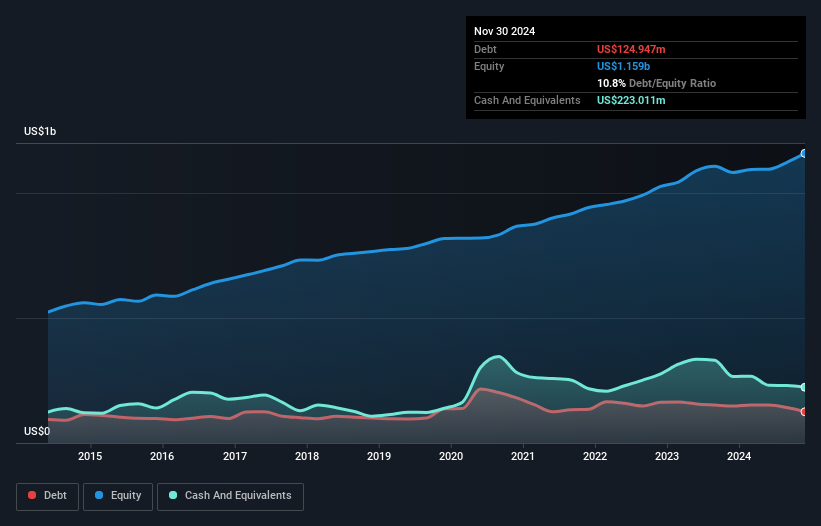Is PriceSmart (NASDAQ:PSMT) A Risky Investment?
Legendary fund manager Li Lu (who Charlie Munger backed) once said, 'The biggest investment risk is not the volatility of prices, but whether you will suffer a permanent loss of capital.' When we think about how risky a company is, we always like to look at its use of debt, since debt overload can lead to ruin. We can see that PriceSmart, Inc. (NASDAQ:PSMT) does use debt in its business. But is this debt a concern to shareholders?
When Is Debt A Problem?
Generally speaking, debt only becomes a real problem when a company can't easily pay it off, either by raising capital or with its own cash flow. Ultimately, if the company can't fulfill its legal obligations to repay debt, shareholders could walk away with nothing. However, a more usual (but still expensive) situation is where a company must dilute shareholders at a cheap share price simply to get debt under control. Having said that, the most common situation is where a company manages its debt reasonably well - and to its own advantage. When we examine debt levels, we first consider both cash and debt levels, together.
Check out our latest analysis for PriceSmart
What Is PriceSmart's Net Debt?
You can click the graphic below for the historical numbers, but it shows that PriceSmart had US$124.9m of debt in November 2024, down from US$148.0m, one year before. However, its balance sheet shows it holds US$223.0m in cash, so it actually has US$98.1m net cash.

How Healthy Is PriceSmart's Balance Sheet?
The latest balance sheet data shows that PriceSmart had liabilities of US$707.6m due within a year, and liabilities of US$221.5m falling due after that. Offsetting these obligations, it had cash of US$223.0m as well as receivables valued at US$44.5m due within 12 months. So its liabilities total US$661.5m more than the combination of its cash and short-term receivables.
While this might seem like a lot, it is not so bad since PriceSmart has a market capitalization of US$2.50b, and so it could probably strengthen its balance sheet by raising capital if it needed to. However, it is still worthwhile taking a close look at its ability to pay off debt. While it does have liabilities worth noting, PriceSmart also has more cash than debt, so we're pretty confident it can manage its debt safely.
The good news is that PriceSmart has increased its EBIT by 7.3% over twelve months, which should ease any concerns about debt repayment. The balance sheet is clearly the area to focus on when you are analysing debt. But ultimately the future profitability of the business will decide if PriceSmart can strengthen its balance sheet over time. So if you're focused on the future you can check out this free report showing analyst profit forecasts.
But our final consideration is also important, because a company cannot pay debt with paper profits; it needs cold hard cash. While PriceSmart has net cash on its balance sheet, it's still worth taking a look at its ability to convert earnings before interest and tax (EBIT) to free cash flow, to help us understand how quickly it is building (or eroding) that cash balance. In the last three years, PriceSmart's free cash flow amounted to 34% of its EBIT, less than we'd expect. That weak cash conversion makes it more difficult to handle indebtedness.
Summing Up
While PriceSmart does have more liabilities than liquid assets, it also has net cash of US$98.1m. On top of that, it increased its EBIT by 7.3% in the last twelve months. So we don't have any problem with PriceSmart's use of debt. The balance sheet is clearly the area to focus on when you are analysing debt. However, not all investment risk resides within the balance sheet - far from it. Be aware that PriceSmart is showing 1 warning sign in our investment analysis , you should know about...
Of course, if you're the type of investor who prefers buying stocks without the burden of debt, then don't hesitate to discover our exclusive list of net cash growth stocks, today.
Have feedback on this article? Concerned about the content? Get in touch with us directly. Alternatively, email editorial-team (at) simplywallst.com.
This article by Simply Wall St is general in nature. We provide commentary based on historical data and analyst forecasts only using an unbiased methodology and our articles are not intended to be financial advice. It does not constitute a recommendation to buy or sell any stock, and does not take account of your objectives, or your financial situation. We aim to bring you long-term focused analysis driven by fundamental data. Note that our analysis may not factor in the latest price-sensitive company announcements or qualitative material. Simply Wall St has no position in any stocks mentioned.
 Wall Street Journal
Wall Street Journal